National Motor Vehicle Company
The National Motor Vehicle Company was an American manufacturer of automobiles in Indianapolis, Indiana, between 1900 and 1924. One of its presidents, Arthur C. Newby, was also one of the investors who created the Indianapolis Motor Speedway.[1]
 | |
| Type | Automobile Manufacturing |
|---|---|
| Industry | Automotive |
| Founded | 1900 |
| Founder | Arthur C. Newby |
| Defunct | 1923 |
| Fate | Consolidated |
| Successor | Associated Motor Industries |
| Headquarters | Indianapolis, Indiana, |
| Products | Automobiles |
Production output | 23,558 (1901-1924) |
The company first concentrated on electric vehicles but soon began producing gasoline-engined cars. National produced a range of four, six, and twelve-cylinder passenger vehicles, as well as numerous successful racing cars. In 1923, National was merged into Associated Motor Industries, which subsequently went out of business in 1924.
History
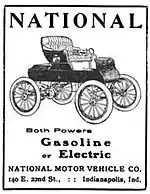
Production models
National's first vehicle was the tiller-steered electric runabout Style A in 1900. The single electric motor was situated at the rear of the car, producing 9 hp (6.7 kW). A 4-speed herring bone transmission was fitted. The reinforced wood-framed car could reach 15 mph (24 km/h). In 1903, the company began producing internal combustion-engined cars with four-cylinder engines made by Rutenber. Electric cars were dropped from production in 1905.
For 1905, a circular radiator became a styling signature of the National brand.[2] National introduced one of the first six-cylinder engines in the 1906 model range, which remained available until the breakup of the company.[2]
.jpg.webp)
Peak production for National was reached in 1915, with over 1,800 cars produced. For 1916, the company introduced the Highway Twelve, a 12-cylinder engine of the company's own design [3] (costing over $1,900[4]) and changed its name to National Motor and Vehicle Corporation. Curiously, the 6-cylinder engine option was priced higher than the 12-cylinder, perhaps because National outsourced the 6-cylinder to Continental under the "Continental Red Seal" moniker.[2]
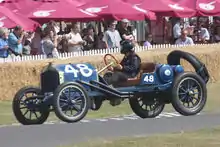
Forced to raise their asking prices to counteract the effects of wartime inflation, National ended up in a higher price range in which they could not compete.[3] For 1920, National dropped their Highway Sixes and Twelves and issued a new model – the Sextet.[3] The Sextet used a Continental side-valve six-cylinder, modified by National engineers with an overhead valve head.[3]
Merger
The company was merged to form Associated Motor Industries in 1922 along with Dixie Flyer and Jackson.[5] Associated was renamed the National Motors Corporation in 1923, and few cars were made until the company ceased production in 1924.[5]
Sporting success
National had the most enviable and successful career of all of the American pre-World War I race cars. For instance, in 1911, in a combination of road races, speedway races, hill climbs and dirt track races, they won a total of 84 times, came in second 48 times and third 30 times.[6]
The Elgin National Trophy race as well as the Illinois Trophy was won by a National 6-cylinder in 1911.[2] In 1912, Joe Dawson won the Indianapolis 500 in a National with an average speed of 78.7 mph.[2] This was the first and only time a stock car ever won the Indianapolis 500.[6]
Advertisements
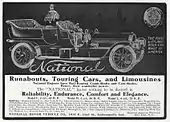 National Six - 1907. |
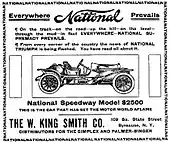 A 1910 National Automobile Advertisement - Syracuse Post-Standard, June 11, 1910 |
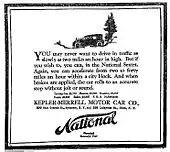 A 1920 National Automobile Advertisement - The Syracuse Herald, July 18, 1910 |
_(cropped).jpg.webp) A 1920 advertisement in Topics magazine, October 20, 1920. |
References
- Clymer, Floyd (1950). Treasury of Early American Automobiles, 1877-1925. New York: Bonanza Books. p. 109.
- Georgano, G. L., ed. (1971). Encyclopedia of American Automobiles (2nd ed.). London: Rainbird Reference Books. p. 142. ISBN 0-525-097929.
- Spajic, Igor. "Vintage Cars of 'The Great Gatsby' – National Sextet, Series BB". vintagecarheritage.com. Archived from the original on 1 March 2014. Retrieved 25 February 2014.
- Dusan Ristic-Petrovic. "Image: Miscellaneous Brochures and Data/1916 Motor Cars/1916 Motor Cars-05". Oldcarbrochures.com. Retrieved 2022-01-10.
- Kimes, Beverly Rae (1996). The Standard Catalog of American Cars: 1805-1942. Iola, IA: Krause Publications. p. 1612. ISBN 0873414284.
- Simeone, Frederick. "1912 National Model 40 Semi-Racing Roadster". Simeone Foundation Automotive Museum. Retrieved 10 March 2015.
Sources
- Frank Leslie's Popular Monthly (January, 1904)
- Clymer, Floyd. Treasury of Early American Automobiles, 1877-1925. New York: Bonanza Books, 1950.